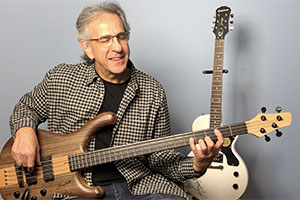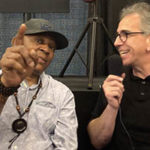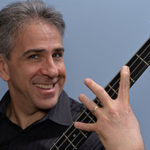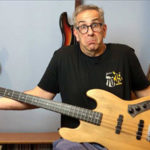“Bass players do think differently”
By Jon Liebman
Week of August 24, 2020
How many guitarists think that just because they play guitar that that automatically qualifies them as a competent bass player?
Sure, there are some guitarists who are good bass players, and there are plenty of bass players who are also good guitar players. But does that mean if you can play one then you can naturally play the other?
The subject came to light in this week’s interview with longtime Yes guitarist Steve Howe, conducted by FBPO’s Gary Graff. Though most people know Steve as a veteran virtuoso guitarist, composer, and vocalist, not nearly as many know that Steve is actually quite a seasoned bass player too. So I thought it would be relevant – and eye-opening – to publish Steve’s interview on a website that’s, well, for bass players only!
“Oh, I love playing the bass,” says Steve. “I often share my bass parts and utilize other people’s talents, but bass is one of the instruments I love to be able to do.”
Though there are a lot physical similarities between guitar and bass, the whole thought process, the whole approach from one to the other couldn’t be more different. It’s not like a saxophone player who’s expected to double on alto, tenor, clarinet, flute, etc. The difference between bass and guitar might as well be compared to the difference between piano and drums.
“Bass players do think differently,” says Steve, who spent nearly 50 years alongside Chris Squire, one of the most revered bass players in rock history. Howe has also done plenty of work with John Wetton, Tony Levin, Nick Beggs, and other high profile low-enders.
If any guitar players want to learn bass, come on down to FBPO and I’ll be happy to help. What we’re going to work on, though, is how to lay down a groove, lock in with the drummer, play with a good time feel, set the foundation for the band, and make the music feel good. And don’t worry, we won’t forget about your bass technique, fingerboard proficiency, scales & theory, and other things you need to know in order to be a good bass player.
Even the greatest guitar players need to recognize that guitar and bass are two different animals, and sometimes one is in your blood more than the other. “I’m very happy with my bass work,” Steve says, “but I do like the contribution of another bass player.”
How about you? Have a thought on the subject? Leave a comment below and let me know what you think. In the meantime, you can check out Gary’s interview with Steve here.





I took private guitar lessons in my youth, but I was also a drummer and played in high school jazz and concert bands. I practiced guitar with a metronome at one time and already had a strong sense of meter and how to lock in with 1 and 3 on my right foot. Picking up bass as I did later, my sense of groove was already built in, and I hated playing in bands where the drummer was lacking and I had to drive the beat with bass. It’s a lot more work, but it also actually helped me become a better player. In the good bands (with good drummers) it was a joy to be the glue between the drummer and everyone else. I could just lay back and let it happen. When I am pressed back into playing guitar, I can be frustrated when whomever was playing bass — wasn’t “getting it,” or not driving the groove.
Like many others way back in the olden days, I started out playing guitar. My band at the time was doing a TV gig in Vermont. After the show the producer came up to me and said, ‘You’re a really good guitar player but have you ever considered playing the bass?’ I asked why and he said, ‘Because I noticed that you think like a bass player. You are very much bass conscious.’ That was the first time that I had ever heard something like that. It was shortly after that show that I switched to bass and I haven’t looked back once. I’m in my comfort zone.